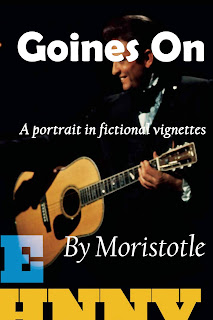 |
| Click image for more vignettes |
Johnny had come out on one of his TV shows and announced that the live audience for the previous week’s show had inspired the song he was about to sing. He would be using cue cards, to make sure he sang the right lyrics, his fourth of fifth draft.
Well, you wonder why I always dress in blackGoines almost choked up watching Johnny Cash sing these lyrics, although he questioned whether Jesus ever preached a “road to happiness.” Maybe Johnny revised that line in a later draft.
Why you never see bright colors on my backAnd why does my appearance seem to have a somber toneWell, there’s a reason for the things that I have on
I wear the black for the poor and the beaten down
Livin’ in the hopeless, hungry side of townI wear it for the prisoner who is long paid for his crimeBut is there because he’s a victim of the times
I wear the black for those who’ve never read
Or listened to the words that Jesus saidAbout the road to happiness through love and charityWhy, you’d think He’s talking straight to you and me
A big point the DVD production made, by way of Kris Kristofferson and others, was that Johnny could sing and say whatever he wanted on the show, and it was always all right, however he may have been cautioned beforehand not to include this or that line of lyric or whatever. Fifty years later, Johnny Cash still spoke to people.
Early the next morning, Goines’ last two hours before time to get up felt like Johnny Cash’s wardrobe. Fearful thoughts and images he was glad he couldn’t remember when he got up had pervaded Goines’ semi-consciousness, and he wasn’t sure he was up to their trip to France, physically or mentally.
Mrs. Goines seemed fully up to it mentally – her sharp mind doing all of the research, booking, scheduling, planning. And she really wanted to go. Goines resorted to reminding himself he was going to France for her.
He thought of the historical Jesus of Nazareth – arrested, awaiting execution. Had the man actually believed that his “heavenly father” had sent him for sacrifice, and did that thought console him as he struggled up Golgotha? Goines felt sympathy for the man.
Early the next morning, Goines’ last two hours before time to get up felt like Johnny Cash’s wardrobe. Fearful thoughts and images he was glad he couldn’t remember when he got up had pervaded Goines’ semi-consciousness, and he wasn’t sure he was up to their trip to France, physically or mentally.
Mrs. Goines seemed fully up to it mentally – her sharp mind doing all of the research, booking, scheduling, planning. And she really wanted to go. Goines resorted to reminding himself he was going to France for her.
He thought of the historical Jesus of Nazareth – arrested, awaiting execution. Had the man actually believed that his “heavenly father” had sent him for sacrifice, and did that thought console him as he struggled up Golgotha? Goines felt sympathy for the man.
| Copyright © 2021 by Moristotle |
Well sir you have inspired me to "resurrect", so to speak, some prose I wrote very late one sleepless night a few years ago, "The things a man does". The computer it's on is such a rust bucket I'll have to go turn it on now and maybe I'll be able to access it after dinner. It is about the validity of the emotions we feel when we do something for someone we care about more than ourslves. Truthfully I cannot remember it all right now, but I will be pulling it out of the files soon, I promise. Goins going to France for his wife is just as much going to France for Goins-because of how important it is to her, it is authentically important to him as well. An act of altruism for love is also self-gratification. Am I making any sense here at all?
ReplyDeleteRoger, I hope that rust bucket didn’t crash trying to start!
DeleteThe “logical” problem of altruism’s beneficiaries has long troubled me. Or, that is, it troubled me until I decided not to let it bother me any longer, just leave it as a mystery of life.
But maybe you’ve revived my concern, for now I wonder whether the mystery is one of “ultimate being” or of human language.
Maybe one of our fine poets can undertake to investigate this in verse – to accompany that prose you’re resurrecting?